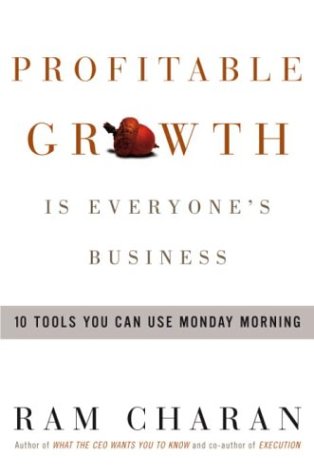|
BY
RICHARD PACHTER
rpachter@wordsonwords.com
Originally
published on Monday, March 1, 2004 in The Miami Herald.
Former Orioles manager (and former Miamian) Earl Weaver said that
his strategy for winning baseball games was hoping for a three-run
home run. A base-clearing blast is a wonderful thing, but hope,
as they say, is not a plan. What you can do, if you want to win,
declares author and consultant Ram Charan, is try to hit a lot of
singles and doubles. You will consistently score runs that way,
and be in prime position to benefit from any shots that are, indeed,
hit out of the park.
Baseball metaphors aside, Charan thinks too many executives are
fixated on only achieving major, multimillion-dollar successes.
Yet smaller wins are often easier to achieve and may ultimately
result in greater gains with fewer risks. And sometimes, they can
result in blockbuster breakthroughs, but the important thing is
to consistently strive for growth in a variety of ways.
Charan is also a strong advocate of dedicated growth budgets, wherein
financial resources are identified and allocated specifically for
projects that promote profitable growth. These could be new products,
sales support, marketing or, in some cases, acquisitions, but what's
always required is a near-obsessive focus on strategies and behaviors
that promote and sustain new revenue.
The author is wary of firms that focus on cost-cutting as a means
of reaching revenue goals while assuming increased productivity
as a given in the equation. He writes: ``Improving productivity
and increasing revenues are seen as two separate issues when they
are, in fact, inseparable. Sporadic, deep cost-cutting -- downsizing,
closing plants, across-the-board budget cuts -- are one-shot reductions
(often without attention to the consequences for revenue growth)
that do not result in doing things in a better way.
``Cost-reduction campaigns are largely a result of the lack of discipline
of productivity improvement on a long-term consistent basis. When
employees experience these cost-reduction campaigns every year and
sometimes two or three times a year, and revenues are flat or declining,
they know they are in a business going nowhere. It becomes a personal-survival
issue and saps their emotional energy.''
The holistic approach favored by Charan employs all of the company's
resources as fuel for the firm's engine of growth. To be sure, urgency
and focus are required at all levels, but most organizations --
like organisms -- would rather grow than die.
As with most books of this type, the author conjures up a number
of examples to illustrate key points, including one threading through
the text that involves the manager of a presumably fictitious Miami-based
furniture store recently gobbled up by a conglomerate.
But mostly, Charan conveys his lessons in an upbeat, amiable and
earnest manner. His ability to communicate serious and often complex
concepts would be highly useful to any executive astute enough to
implement the philosophy of striving to do lots of small and medium
things successfully. It could give such organizations a decided
advantage over bigger, better-funded teams. Play ball -- and go
Marlins!
(I alternately read this book and listened to the audio version,
by the way, and recommend either, depending on your personal preference
and the duration of your commute or exercise routine.)
Like business books? Join the club.
|

